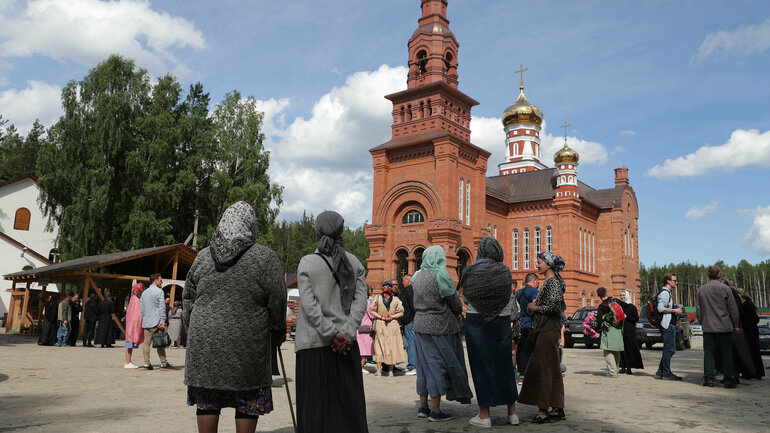Religion and decentralisation in Russia in times of Covid-19

The Covid-19 crisis has revealed many previously unnoticed social and political processes that are taking place in Russia and elsewhere. In Russia, decentralisation is one of these discreet developments. During the outbreak, it has been up to the governors and local administrations of the country’s regions and republics to make decisions about introducing or lifting quarantine measures.
Different regions made different decisions: almost twenty regional administrations decided not to have a parade to mark the seventy-fifth anniversary of victory in the Second World War, one of the cornerstones of Russian national identity, because of the pandemic. This and other cases, although hardly representing major structural changes, have made Russia’s existing social structures and their evolution more visible.
The Russian Orthodox Church, which is conventionally criticised as an ally of the state, is going through similar challenges. Bishops had to decide when and how the churches and monasteries in their dioceses should provide services for believers. In many religious communities, especially monasteries, these decisions were made by community leaders, making decentralisation even deeper. In many cases, these decisions contradicted the recommendations of a bishop or a local government. Despite Covid-19 restrictions, many monasteries kept receiving pilgrims and tried to hide the numbers of infected monks or nuns. Such practices highlighted the church’s special status within the Russian state.
Orthodox Covid-19 dissidents
During the Covid-19 outbreak, some clergy ignored instructions to stop serving communion or to clean liturgical spoons after each use. They did so for practical or religious reasons, or a combination of the two. Practically, the clergy needed believers to attend church to survive financially in difficult times. At the same time, the clergy wanted to help regular churchgoers who needed spiritual support. Yet, there is another reason for the move: many Orthodox Christians in Russia have become total or partial Covid-19 deniers. While total Covid-19 dissidents deny the existence of the disease altogether, partial deniers reject the possibility that any virus or bacterium could contaminate the holy bread and wine they take during Holy Communion.
The Russian Orthodox Church embraces diverse audiences and welcomes people of different opinions. On the one hand, many priests and bishops recently mobilised in favour of a controversial constitutional reform that will keep the current Russian president in power until 2036. They acted like civil servants, such as school principals, who participated in the 1 July referendum on the issue and were obliged to bring other people with them to vote. On the other hand, the church includes critics of the current political regime, though of a very special type.
One of these dissidents is Father Sergiy Romanov. He is a founder, organiser, and spiritual father of a large convent near Sredneuralsk, a small town in the Urals. Father Sergiy is famous among Orthodox Christians in the region and beyond as a ‘strong priest’ whom people visit for confession and spiritual advice in situations of existential crisis or emotional breakdown. He has built a broad network and become popular among some political and other elites, attracted by his “authentic folk spirituality”, who share or at least tolerate his conservative views and conspiracy theories.
Father Sergiy preaches that Covid-19 is fake and that people do not have to maintain physical distancing or follow other measures imposed by secular or church authorities. He has also stated publicly that the current Russian government is a part of a worldwide conspiracy of Jews against the Russian people. And, quite logically, he urged his compatriots not to participate in the referendum on constitutional reform.
Autocratic islands beyond state control?
In contrast to secular political dissidents, Orthodox dissidents are neither liberal nor democratic. People like Father Sergiy are politically conservative and anti-modernist, are usually poorly educated, both theologically and culturally, and serve as leaders mostly for socially deprived people. Father Sergiy and some other Orthodox priests like him build their own small autocratic republics within the heterogeneous Orthodox world, seemingly beyond state control.
The Russian Orthodox Church governs this decentralisation tendency quite successfully. The church needs charismatic mystics and talented managers, so it tries to keep them within its fold. Sometimes, however, these leaders and their followers refuse to obey. In such cases, the Church and the Russian state eventually annex these emerging dissident islands. On 2 July, Father Sergiy was fired from his priesthood and ordered to leave his monastery by the bishop of Yekaterinburg. In addition, he was fined for spreading lies about Covid-19 by the secular authorities. Decentralisation can be tolerated until it becomes too visible to be further ignored.
Jeanne Kormina is a professor of anthropology and religious studies at the Higher School of Economics in St Petersburg and a fellow at the Wissenschaftskolleg in Berlin.